
New World Coming
The Sixties and the Shaping of Global Consciousness
La description
New World Coming: The Sixties and the Shaping of Global Consciousness is a collection of the most innovative essays from a major international conference of the same name, held at Queen’s University from June 13?16, 2007. The collection examines the many ways in which a ?global consciousness? was forged during the Sixties.
In various sections, essays examine the ways revolution was imagined throughout the Sixties, the implications of the ?nation? for various liberation movements, the complex politicization of bodies during this time, and the enduring legacy of the period in terms of lasting political movements and cultural landscapes.
Featuring a colour insert of protest poster art, this is the first anthology of its kind to bring scholars from many areas of the world together to discuss and debate the meaning and impact of these vastly transformative years.